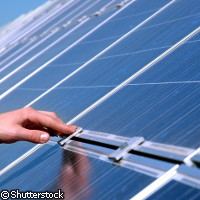Europeans to resolve red tape snags for solar energy
Europeans, particularly in the southern areas, are favouring the use of solar power over the conventional oil and gas methods. The conversion of sunlight into electricity can keep costs down and help sustain the environment. While the system seems foolproof, experts say problems exist with respect to the installation of advanced solar power systems. A team of researchers has launched an investigation to determine the source of this headache: red tape! Photovoltaics (PV), the field of technology and research that converts solar energy directly into electricity, has been attracting extensive interest both in Europe and abroad because of its beneficial characteristics as a renewable energy. But despite being a vital energy technology for power production, bureaucratic procedures make its use difficult. The PV LEGAL project, co-funded under the EU's Intelligent Energy Europe Programme, is analysing the restrictions of installing and linking solar PV power systems. Specifically, the project partners are examining why the installation of PV systems can take anything from weeks to years in the EU Member States. The partners, from the Czech Republic, Italy, Spain, Poland and the UK, among others, are led by the Berlin-based German Solar Industry Association (BSW-Solar). The Renewable Energy Association (REA) is leading the work for the UK. By the end of the project, the team hopes to provide answers on how to beat the regulatory market barriers for PV systems and curb the lead time for connecting a PV system to the power grid. The initial phase of the project centres on the creation of a comprehensive database that will enable PV systems investors to evaluate the bureaucratic obstacles they face. Stakeholders, policy makers and grid operators will use the database to conduct a systematic analysis of practical experiences with red tape and grid connection issues, essential issues that hamper investors' efforts. Quashing these barriers will give both the EU and industry a huge boost, the experts believe. Latest data suggest that solar systems can supply up to 12% of Europe's total power needs by 2020. But figures show that poor take-up results in only 1% (1.5 million) of homes being supplied with this electricity. 'REA is delighted to be leading this important piece of work on the barriers faced by PV in the UK,' explained Stuart Pocock, who is REA's head of Onsite Renewables. 'With the tariffs due to come in next year, this project will provide a detailed examination of everything standing in the way of installations running as smoothly as possible. The project will deliver real benefits to improving the regulatory and administrative framework and helping to optimise the uptake of solar PV.' The PV LEGAL consortium consists of PV industry associations including the Italian National Photovoltaic Industry Association (Assosolare) and the Hellenic Association of Photovoltaic Companies (HELAPCO), as well as the European Photovoltaic Industry Association (EPIA) and eclareon Management Consultants. Bulgaria, the Czech Republic, the Netherlands and Portugal are being covered by subcontractors.



